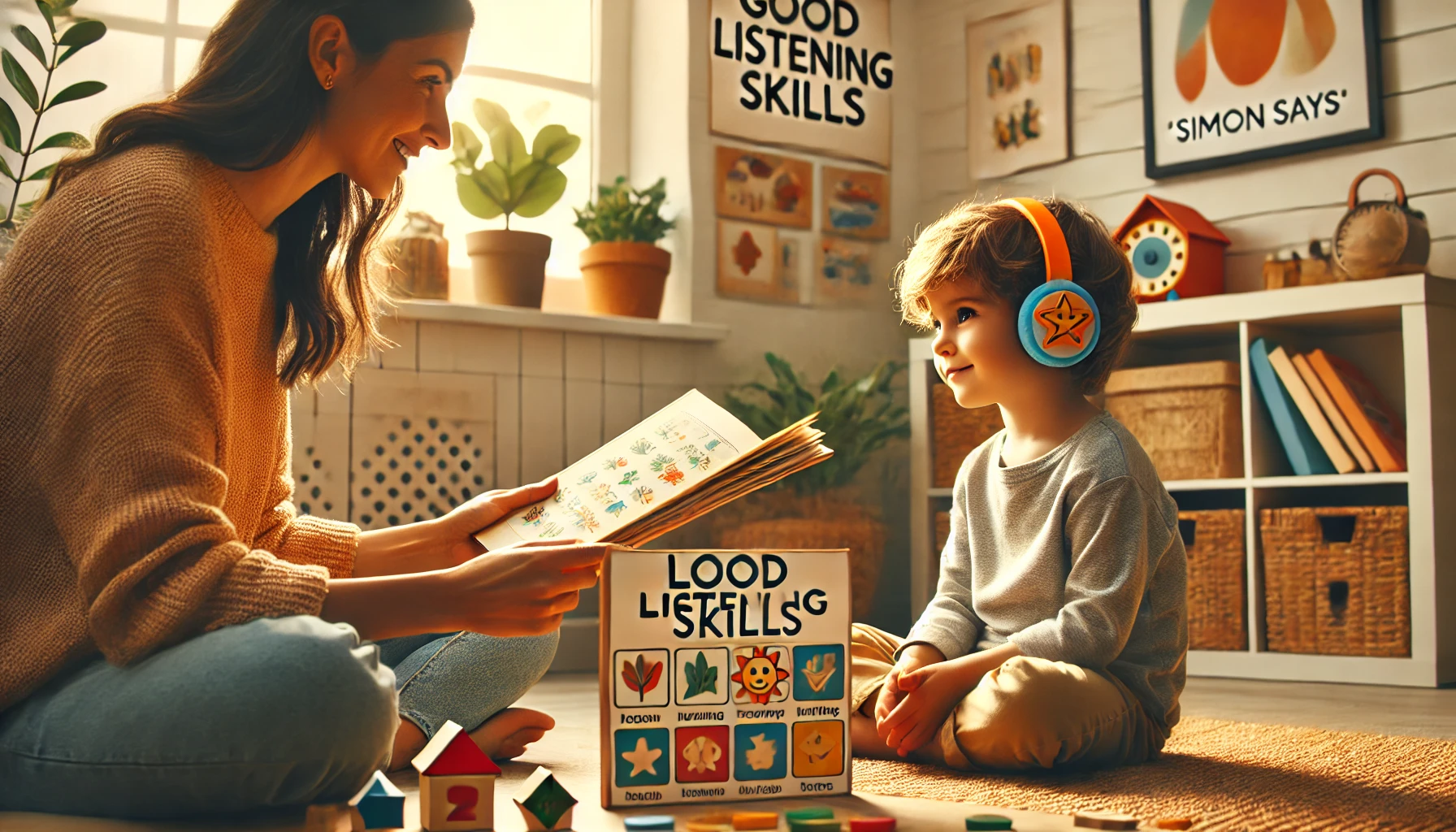How to Help Young Children Develop Good Listening Skills at Home
Listening is a fundamental skill that helps children understand instructions, build relationships, and communicate effectively. Teaching children to be good listeners at an early age improves their focus, social interactions, and ability to follow directions. In this article, we’ll explore fun and practical ways to enhance listening skills at home.
Why Good Listening Skills Matter
- Improves comprehension – Helps children understand stories, instructions, and conversations.
- Strengthens social interactions – Encourages respectful communication and empathy.
- Enhances learning abilities – Improves focus and attention in educational settings.
- Develops patience and self-control – Teaches children to wait their turn and process information before responding.
1. Model Active Listening
Children learn by example, so demonstrating good listening habits is essential.
Activity Idea:
- Maintain eye contact when your child is speaking.
- Nod or respond with phrases like, “I see,” or “That sounds interesting.”
- Repeat back what they say to show you’re engaged: “So you’re telling me that you built a tower with your blocks?”
What Kids Learn:
- How to focus on conversations
- The importance of responding thoughtfully
- Respectful communication skills
2. Play Listening Games
Games make learning fun and reinforce active listening skills.
Activity Idea:
- Simon Says – Encourages children to listen carefully to instructions.
- Musical Statues – Teaches children to react to sound cues by freezing when the music stops.
- Sound Matching Game – Have kids close their eyes and guess different sounds (clapping, tapping, animal noises).
What Kids Learn:
- How to follow instructions accurately
- Improved attention and reaction skills
- Active listening in playful situations
3. Read Stories and Ask Questions
Reading together strengthens listening comprehension.
Activity Idea:
- Pause while reading and ask, “What do you think will happen next?”
- Encourage your child to summarize the story in their own words.
- Ask open-ended questions about characters’ feelings and actions.
What Kids Learn:
- Story comprehension skills
- Critical thinking and recall
- The importance of listening for details
4. Use Call-and-Response Activities
Interactive activities help children practice listening and responding appropriately.
Activity Idea:
- Say, “When I say ‘Ready, set,’ you say ‘Go!’”
- Clap a rhythm and ask your child to repeat it.
- Ask, “If you can hear me, touch your nose,” and change actions each time.
What Kids Learn:
- Quick thinking and auditory processing
- Turn-taking and interaction skills
- Improved response to verbal cues
5. Encourage One Task at a Time
Helping children focus on a single instruction improves listening habits.
Activity Idea:
- Give simple directions: “First, put your toys away. Then, come to the table.”
- Gradually increase the number of steps in instructions as they improve.
- Praise them when they complete tasks correctly without needing reminders.
What Kids Learn:
- Following sequential instructions
- Strengthening memory and attention
- The importance of focusing on one thing at a time
6. Limit Distractions During Conversations
Creating a distraction-free environment improves listening skills.
Activity Idea:
- Reduce background noise (TV, music) during important discussions.
- Encourage face-to-face conversations without interruptions.
- Set designated “quiet times” for reading or storytelling.
What Kids Learn:
- How to focus on conversations
- The value of giving full attention
- Improved concentration
7. Teach the Importance of Turn-Taking in Conversations
Practicing turn-taking ensures children learn respectful listening habits.
Activity Idea:
- Use a talking stick—whoever holds it gets to speak while others listen.
- Encourage kids to wait until someone finishes speaking before responding.
- Play “pass the story,” where each person adds to a story after listening carefully.
What Kids Learn:
- The importance of waiting their turn
- Listening before speaking
- Cooperative conversation skills
8. Reinforce Listening with Positive Feedback
Acknowledging good listening behavior encourages children to keep practicing.
Activity Idea:
- Say, “I love how you listened carefully and followed directions today!”
- Use a sticker chart to track good listening moments.
- Ask, “How did it feel when you listened and understood what was being said?”
What Kids Learn:
- Motivation to practice good listening
- Self-awareness of their listening habits
- Positive reinforcement of good behavior
Final Thoughts
Helping young children develop good listening skills is key to their communication, learning, and social development. By modeling active listening, playing interactive games, and reinforcing good habits, parents can create a strong foundation for respectful and attentive listening at home.
